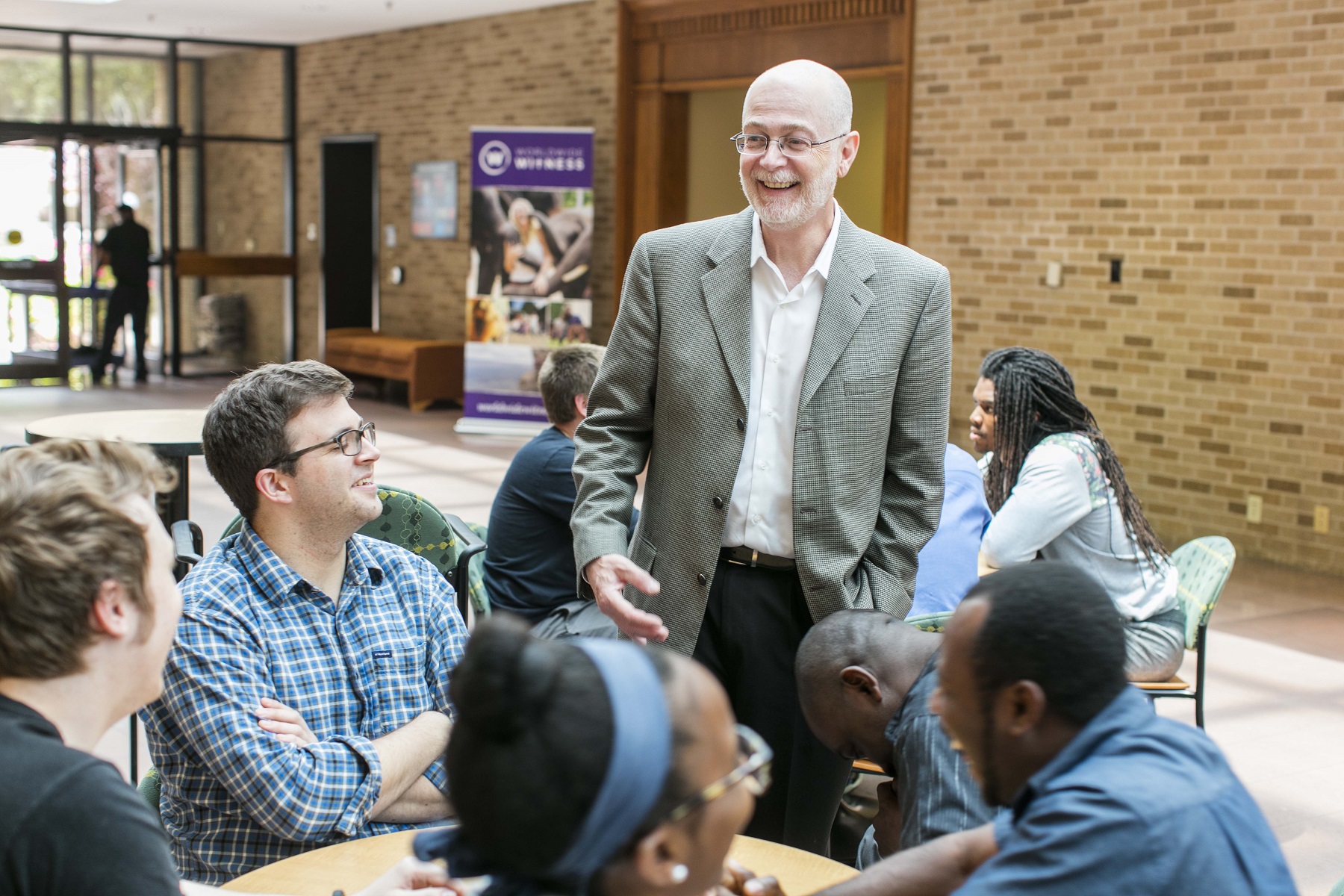Master of Divinity (M.Div.)
The online Master of Divinity (M.Div.) is the most comprehensive formational degree for ministry that ACU’s Graduate School of Theology offers.
The M.Div. online program is designed to offer you a firm grounding in scripture, history and theology as well as training in practical ministry skills such as the art of preaching and reading cultures and contexts. This graduate degree, which offers missions or ministry concentration, will prepare you to enter into ministry or expand your current vocation. This accredited online M.Div. program also provides a solid foundation for further study in Ph.D., Th.D. and D.Min degree programs.
Master of Divinity is also available as a residential program in Abilene.
Meet the Program Director
Dr. Mindi Thompson is an Associate Professor and Director of Distance Education. She joined the Graduate School of Theology in 2011. Dr. Thompson received her Ph.D. from Luther Seminary where she focused on the Old Testament. She holds an M.A. from Emmanual Christian Seminary, and her B.A. and A.A. are from Minnesota Bible College. She earned the honor of Outstanding Faculty of the Year for the College of Biblical Studies at ACU in 2015. She is the co-author of the book, To the Ends of the Earth: Cultural Considerations for Global Online Theological Education and author of the publication, Reading Leviticus 19: Issues for Interpretation.
“One of my favorite scripture passages is the parable of the talents (Matthew 25:14-30, Luke 19:11-27). As a woman with leadership gifts serving in a church tradition that doesn’t always welcome those gifts, it can be a challenge to find ways to use my talents. I’m convinced, though, that when I stand before the Lord and he asks me to give an accounting for how I used the gifts he gave me, ‘They wouldn't let me!’ won’t be a good excuse. My calling is to remain faithful with the little I’ve been given, trusting that God will grow it into something useful for his purposes.”

Degree Highlights
Timeframe
Credit hours: 72
Program length: 4 years
Example Coursework
Foundations of the Theology of Ministry
Critical Interpretation of the New Testament
Introduction to Hebrew I
Christian Mission in Global Context
Department
Graduate School of Theology
Upcoming Start Dates
January 11, 2021
Why Choose a Master of Divinity Degree Online?
Our Master of Divinity online program emphasizes learning in context – you will explore case studies and ministry scenarios. Contextual mentoring provides an informal setting for prayer and discussion with a local mentor.
Ready to be a part of a graduate community dedicated to helping you answer God’s calling for you? Pursue your Master of Divinity degree online at ACU Online.
Apply now or contact us for more information about our online Master of Divinity today. We understand the cost of graduate school can be overwhelming, which is why ACU offers a variety of financial assistance to qualifying students. Learn more about financial aid options here.

M.Div. Admissions Requirements
- A complete application and application fee.
- An official transcript(s) in English (or translated to English) of all previous colleges attended. The transcript must indicate an earned bachelor's degree from a regionally accredited college or university or equivalent.
- A cumulative undergraduate approximate B average or above in the area of focus or related area and evidence of an overall productive GPA.
- Two letters of recommendation (may be submitted through the online application).
- Personal statement of interest.
- Writing assessment.
See full ACU online graduate catalog, including admissions requirements here. For a comprehensive list of admission requirements for our online Master of Divinity programs, please contact a Graduate Advisor.
You can expect the following outcomes after graduating with your online Master of Divinity degree:
Graduates will have ability to integrate theology in contemporary cultural contexts
Indicators:
- Critically interprets the role of historical and cultural contexts in the formation of theological perspectives
- Discovers and analyzes the key elements of a cultural context, including congregations and a culture other than one’s own
- Constructs specific theological proposals that are in accordance with the purposes of God’s Kingdom and appropriately suited to particular contexts
- Formulates and begins to practice a coherent Christian engagement with secular culture and with different religions
- Explains one’s core theological commitments and applies them effectively to address the spiritual, ecclesial, ethical, and social issues of one’s context
- Exercises effective pastoral leadership, based on a clear understanding of a congregation’s culture, in shaping the sacramental and symbolic life of the church in accordance with the contextualized practice of its mission
- Implements practical theological proposals according to the needs of particular contexts, including multicultural and cross-cultural contexts
- Effectively embodies the Gospel in ways that integrate theological insight with the competent interpretation of one’s context
- Facilitates a critical engagement between theological insights and other areas of knowledge and practice
Awareness of the historical and contemporary beliefs and practices of the worldwide church, and the Stone-Campbell heritage in particular
Indicators:
- Comprehends and evaluates the key figures, movements, and events of church history
- Comprehends and evaluates the key beliefs and practices of contemporary global Christianity
- Exhibits critical reflection on and mature respect for the historic and contemporary beliefs and practices of the Stone-Campbell heritage (or one’s own tradition)
- Critically analyzes one’s own theological and spiritual practices in relation to historic and contemporary Christianity, especially that of the Stone-Campbell heritage (or one’s own tradition)
- Critically analyzes contemporary situations in light of historical knowledge and appropriately applies that knowledge in ministerial practice
Graduates will have ability to lead and equip the church for its various ministries
Indicators:
- Employs critical thinking, problem-solving, and decision-making sufficient for ministerial effectiveness
- Demonstrates the ability to lead the church in interpreting its context, discerning its mission, and evaluating its orientation to the purposes of God
- Demonstrates the ability to lead the church in shaping its corporate identity and implementing God’s vision in its context
- Demonstrates the ability to teach, equip, and lead individuals of different ages and various levels of faith development
- Exercises one’s ministerial role in a way that constructively engages the polity of one’s context
- Works collaboratively with others
- Skillfully manages conflict in a way that enables constructive transformation and peacemaking
- Manages ministerial boundaries with maturity and wisdom
Graduates will have capacity to exercise care of souls in fitting and compassionate ways
Indicators:
- Treats others with respect and acts according to their best interests
- Exhibits sensitive, caring, and skillful attention to the needs of those in crisis
- Provides apt counsel, guidance, and practical instruction
- Integrates the practice of skillful caregiving techniques with disciplined theological reflection
Graduates will demonstrate growth in Christian character essential for ministerial faithfulness and effectiveness
Indicators
- Conducts oneself in the manner of a Christian exemplar
- Demonstrates healthy awareness of one’s personality, behavior patterns, level of interpersonal effectiveness, and patterns of response to anxiety and conflict
- Demonstrates commitment to conduct one’s life out of a confessed Christian faith and exhibits the practices of discipleship
- Demonstrates sustained participation in Christian community and constructive investment in its life
- Takes honest responsibility for one’s actions, habits, and growth, applying effective strategies and spiritual disciplines for achieving ongoing growth
- Acts in a principled fashion so as to increase one’s credibility and build trust—with integrity, humility, dependability, and compassion
- Discerningly receives criticism and takes initiative to change if necessary
- Demonstrates commitment to the well-being of one’s spouse and family



